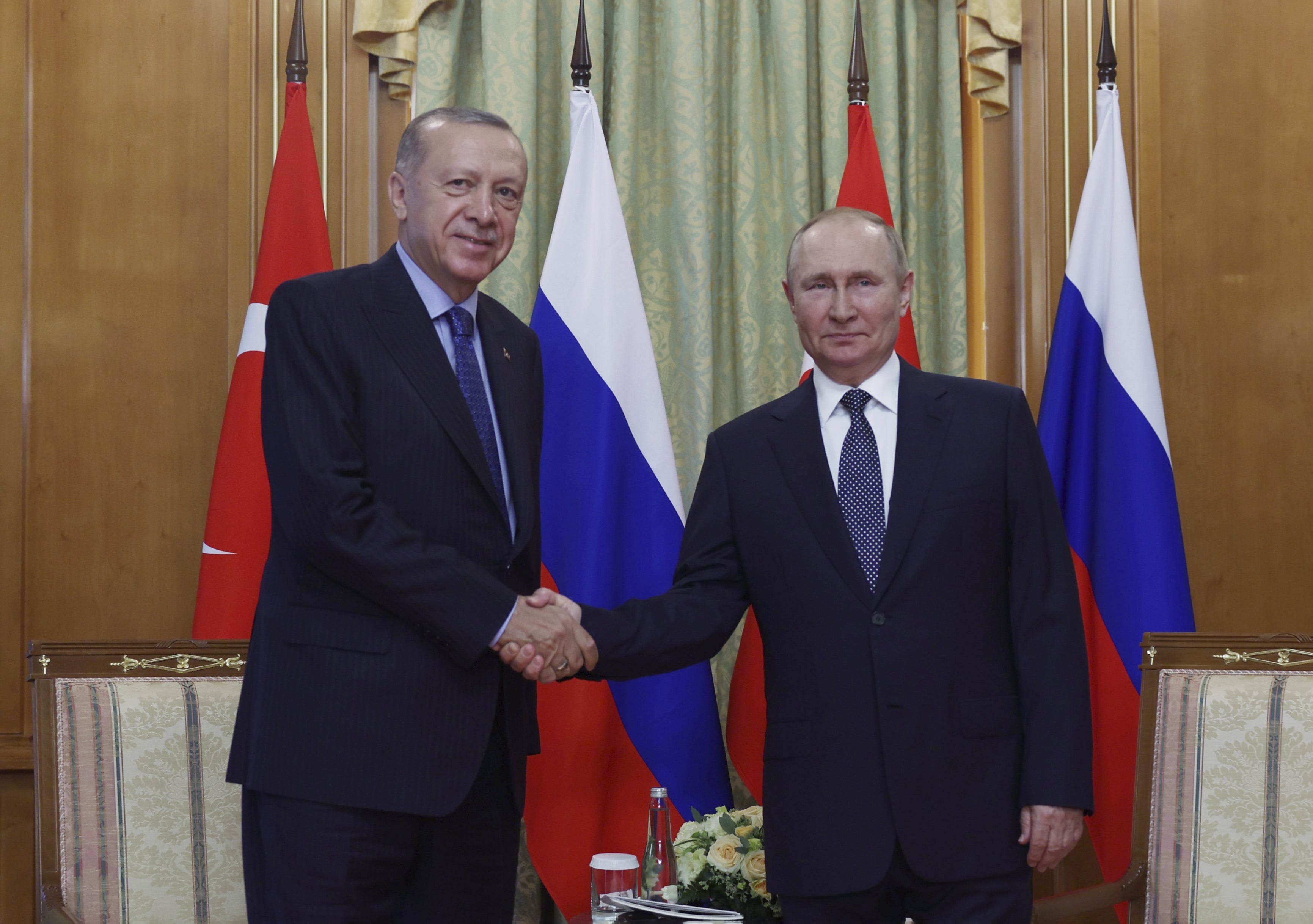Erdogan: Turkey will start paying for Russian gas in rubles
After the Sochi talks, an agreement has been made on the payment for Russian gas.
-

Turkish President Recep Tayyip Erdogan, left, and Russian President Vladimir Putin shake hands prior to their meeting at the Rus sanatorium in the Black Sea resort of Sochi, Russia, Friday, Aug. 5, 2022 ( Turkish Presidency via AP )
Turkish President Recep Tayyip Erdogan has asserted Ankara will start paying for Russian gas in rubles.
Moscow previously made the announcement late Friday after more than 4 hours of talks between Erdogan and Russian President Vladimir Putin in Sochi, Russia.
Washington has been pushing countries to impose economic sanctions on Russia in response to February 24. However, Turkey, which is a NATO member, has attempted to remain neutral in the war due to its heavy dependence on Russian energy.
Read more: Turkey: Joining sanctions against Russia unrealistic
About 25% of Turkey's oil imports are from Russia, and 45% of its natural gas is also from Russia as of last year.
"As Turkey, our door is open to everyone," Erdogan said Saturday on his way home from Sochi. "One good thing about this Sochi visit is that we agreed on the ruble with Mr. Putin," Erdogan said.
"Since we will conduct this trade in rubles, it will of course bring money to Turkey and Russia."
No side has revealed how much of Russian gas will be paid for in rubles.
Turkey's payment of Russian gas in rubles, avoiding the dollar, will protect the Turkish economy from its diminishing hard currency reserves.
Last year, the Turkish government spent tens of billions of dollars trying to support the lira as it steeply declined in the latest economic crisis. The lira has so far lost 55% of its value against the dollar, while consumer prices have soared 80% in the past year.
The United States and the European Union are trying to pressure Russia's customers from switching to ruble payments to limit Moscow's abilities in the war in Ukraine.
Read next: Turkey-Russia trade doubles in April: Turkish FM
Turkey, Russia Sign Roadmap for Economic Cooperation
Turkish President Recep Tayyip Erdogan said on Saturday that Turkey and Russia signed a roadmap for economic cooperation, intending to bring trade turnover between the countries to $100 billion.
"During our bilateral meeting, we exchanged views on the further development of our trade and economic cooperation. We have previously stated that our trade target is $100 billion," Erdogan stated, adding that "in this direction, we want to develop our cooperation in such areas as energy, trade, tourism, and agriculture. We are determined to ensure a more balanced volume of bilateral trade."
"A memorandum of understanding, a kind of a roadmap for our trade and economic relations was signed in Sochi by our Minister of Trade [Mehmet Mus], and Russian Deputy Prime Minister Alexander Novak," Erdogan told reporters upon his return from Sochi.
Erdogan added that he also discussed with Putin the use of Russia's Mir payment card in Turkey, and that there is serious progress on the matter.
During his meeting with Turkish President Recep Tayyip Erdogan in Sochi, Putin said that "It is enough to remind that our trade turnover increased by 57% in the last year, and it surged twofold in the first months of this year, up to May inclusive. We have large-scale projects."
Putin Has 'Fair Approach' to Turkey on Syrian Issue
Turkish President Recep Tayyip Erdogan said that Russian President Vladimir Putin adheres to a "fair approach" to Turkey on the Syrian issue and supports Ankara in the fight against terrorism.
"Mr Putin has a fair approach to Turkey on this [Syrian] issue. He specifically states that he will always be with us in the fight against terrorism," Erdogan said upon his return from Russia's Sochi, where he met with the Russian president. "We say that our intelligence organization is already dealing with these issues with the Syrian intelligence, but our efforts are aimed at getting a result."
Ahead of a meeting between Russian President Vladimir Putin and his Turkish counterpart Recep Tayyip Erdogan on Friday, the Kremlin urged Ankara not to "destabilize" Syria with a military offensive.
"Turkey has legitimate concerns for security reasons, which we, of course, take into account," Kremlin spokesperson Dmitry Peskov told reporters.
"It is very important not to allow any action that could lead to destabilization of the situation in Syria, or that could jeopardize the territorial and political integrity of Syria," he added.

 4 Min Read
4 Min Read








